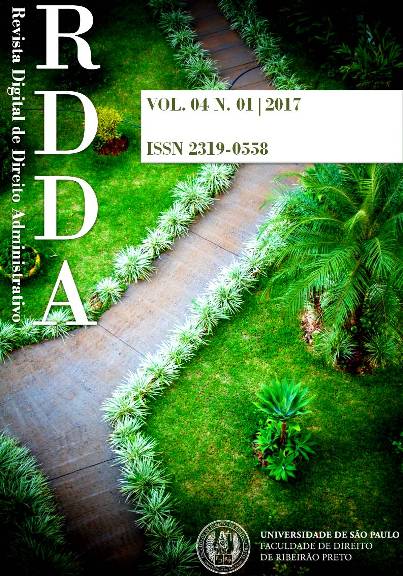International Administrative Law: the constitution of a concept in the mirror of a changed Statehood
DOI:
https://doi.org/10.11606/issn.2319-0558.v4i1p15-31Palabras clave:
international administrative Law, global administrative LawResumen
Characteristic legal concepts do not only have an ordering function. Behind them, there are conceptions, which at the same time show observation relationships and define research perspectives. This paper seeks to demonstrate these roles in relation to the concept of international administrative Law (Internationalen Verwaltungsrechts), which is discussed here with three variants for the purpose of scientific clarification, once it is relevant to demonstrate the structures that underlie legal concepts and the preconceptions they carry. The conceptual variations analyzed are: international administrative Law as Collision Law (Internationales Verwaltungsrecht als Kollisionsrecht), as global administrative Law and as Action, Determination and Cooperation Law based on international law (im Völkerrecht begründetes Aktions-, Determinations- und Kooperationsrecht)
Descargas
Descargas
Publicado
Número
Sección
Licencia
Autores que publicam nesta revista concordam com os seguintes termos:
- Autores mantêm os direitos autorais e concedem à RDDA o direito de primeira publicação, com o trabalho simultaneamente licenciado sob a Creative Commons Attribution-NonCommercial-ShareAlike 4.0 International License. que permite o compartilhamento do trabalho com reconhecimento da autoria e publicação inicial nesta revista.
- Autores têm autorização para assumir contratos adicionais separadamente, para distribuição não-exclusiva da versão do trabalho publicada nesta revista (ex.: publicar em repositório institucional ou como capítulo de livro), com reconhecimento de autoria e publicação inicial nesta revista (referência à RDDA).
- Autores têm permissão e são estimulados a publicar e distribuir seu trabalho online (ex.: em repositórios institucionais ou na sua página pessoal) a qualquer ponto antes ou durante o processo editorial, já que isso pode gerar alterações produtivas, bem como aumentar o impacto e a citação do trabalho publicado (Veja O Efeito do Acesso Livre).


